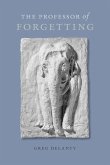Short description/annotation
A study of the concepts of memory and forgetting in Renaissance drama.
Main description
Engaging with current debates over the nature of subjectivity in early modern England, this fascinating and original study examines sixteenth and seventeenth century conceptions of memory and forgetting, and their importance to the drama and culture of the time. Garrett A. Sullivan, Jr. discusses memory and forgetting as categories in terms of which a variety of behaviours - from seeking salvation to pursuing vengeance to succumbing to desire - are conceptualized. Drawing upon a range of literary and non-literary discourses, represented by treatises on the passions, sermons, anti-theatrical tracts, epic poems and more, Shakespeare, Marlowe and Webster stage 'self-recollection' and, more commonly, 'self-forgetting', the latter of which provides a powerful model for dramatic subjectivity. Focusing on works such as Macbeth, Hamlet, Dr. Faustus and The Duchess of Malfi, Sullivan reveals memory and forgetting to be dynamic cultural forces central to early modern understandings of embodiment, selfhood and social practice.
Table of contents:
Acknowledgments; Introduction: planting oblivion; 1. Embodying oblivion; 2. 'Be this sweet Helen's knell, and now forget her': forgetting and desire in All's Well That Ends Well; 3. 'If He Can Remember': spiritual self-forgetting in Doctor Faustus; 4. 'My Oblivion is a Very Antony'; 5. Sleep, conscience and fame in The Duchess of Malfi; Coda: 'Wrought with Things Forgotten'.
Hinweis: Dieser Artikel kann nur an eine deutsche Lieferadresse ausgeliefert werden.
A study of the concepts of memory and forgetting in Renaissance drama.
Main description
Engaging with current debates over the nature of subjectivity in early modern England, this fascinating and original study examines sixteenth and seventeenth century conceptions of memory and forgetting, and their importance to the drama and culture of the time. Garrett A. Sullivan, Jr. discusses memory and forgetting as categories in terms of which a variety of behaviours - from seeking salvation to pursuing vengeance to succumbing to desire - are conceptualized. Drawing upon a range of literary and non-literary discourses, represented by treatises on the passions, sermons, anti-theatrical tracts, epic poems and more, Shakespeare, Marlowe and Webster stage 'self-recollection' and, more commonly, 'self-forgetting', the latter of which provides a powerful model for dramatic subjectivity. Focusing on works such as Macbeth, Hamlet, Dr. Faustus and The Duchess of Malfi, Sullivan reveals memory and forgetting to be dynamic cultural forces central to early modern understandings of embodiment, selfhood and social practice.
Table of contents:
Acknowledgments; Introduction: planting oblivion; 1. Embodying oblivion; 2. 'Be this sweet Helen's knell, and now forget her': forgetting and desire in All's Well That Ends Well; 3. 'If He Can Remember': spiritual self-forgetting in Doctor Faustus; 4. 'My Oblivion is a Very Antony'; 5. Sleep, conscience and fame in The Duchess of Malfi; Coda: 'Wrought with Things Forgotten'.
Hinweis: Dieser Artikel kann nur an eine deutsche Lieferadresse ausgeliefert werden.








